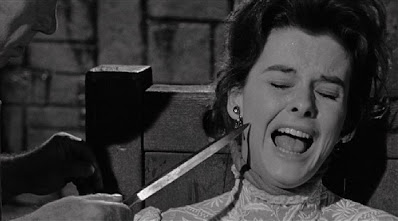... aka: Der unheimliche Mr. Sardonicus (The Scary Mr. Sardonicus)
... aka: El barón Sardonicus (Baron Sardonicus)
... aka: Sardonicus
Directed by:
William Castle
Directed by:
William Castle
"It's good to see you again, my homicidal fiends!" Director William Castle opens the film with an amusing prologue to let us know we're in for "...an old-fashioned story, full of gallantry and graciousness and ghouls!" Things begin in a very hazy London circa 1880, where a strange, one-eyed man drops off an important letter for brilliant young doctor Sir Robert Cargrave (Ronald Lewis). The urgent letter asks him to return to a (fictional) Central European town called Gorslava. Since it was written by his lost love Maude (Audrey Dalton), who was forced into an arranged marriage to the very wealthy, much older nobleman Baron Sardonicus (Guy Rolfe) by her father years earlier, Robert decides to cancel all of his appointments indefinitely, postpone being one of the first to make use of a brand new invention (the hypodermic needle) and boards a train toward Gorslava. Upon arrival, Robert is met by at the station by the one-eyed man who dropped off the letter - gruff slow-wit Krull (Oscar Homolka), a faithful servant of the Baron's - and heads to the castle to find out why he's been summoned there.
As soon as he enters the castle doors, Robert is greeted with the sight of the leech-covered maid tied down to a chair, or as Krull refers to her, a "guinea pig." Empty frames adorn the castle walls, no mirrors are to be found anywhere in the castle, there's a special padlocked room the servant refer to as "The Chamber of Horrors" and all of the vegetation outside is dead. Robert is soon reunited with his old flame Maude and confesses to her that he's had no other woman since her and has immersed himself in his studies and work instead. He also meets up with the Baron, whose face is covered with an expressionless waxen mask. The Baron doesn't mind flaunting his infidelities in front of his wife and has his trusty servant gather together five village girls, promising them food, wine and gold for their services. He selects the fairest of them all, but she makes the mistake of removing his mask. Mr. Sardonicus also wants his wife to persuade Robert to help him in his schemes, even if means seducing him.
Sardonicus relates a flashback to explain his current predicament. He was once a peasant named Marik Toleslawski, whose father (Vladimir Sokoloff) had given him a lottery ticket right before passing on. Eventually, Marik and his demanding wife Elenka (Erika Peters) discovered that they have the winning ticket. The problem? It was in the pocket of a vest the father was buried in. Elenka coerces Marik to dig up the grave and, in doing so, Marik emerges with the same ghastly permanent grin as the his father's corpse. It may be punishment from God, a hellish curse or just the psychological effects of a terrible shock, but either way, Sardonicus is sick of feeling like a freak and wants Robert to restore his face. Robert spends all day using heated damp towels and massage, but to no avail. All he has left are untried, experimental techniques, which he refuses to do for any amount of money. Sardonicus threatens to disfigure Maude's face unless he complies with his wishes, so Robert cooks up a clever scheme utilizing the poison of a rare, powerful plant that's said to permanently relax muscles...
After a plot twist at the end, Castle shows up again to introduce his patented interactive gimmick. This time it's the "Punishment Poll," a small glow-in-the-dark card that was handed out to viewers with a Thumb's Up and Thumb's Down picture. If audiences thought Sardonicus had suffered enough up to that point, they do a Thumb's Down for Mercy, but if they think he deserves even more punishment that he has received, it's a Thumb's Up for No Mercy. Castle knew his audience well enough to know that he didn't even have to bother shooting the "merciful" ending!
It's a fun enough minor, set-bound Gothic tale with lots of fog and appropriate costuming, black-and-white-photography and art direction. The cast is quite good, with Lewis just fine in the lead and Rolfe a suitably arrogant and loathsome dashing villain. Best of the lot though is Homolka as the sometimes sadistic, sometimes pitiful and always hilarious disfigured servant. The Sardonicus make-up design by Ben Lane is excellent and was clearly influenced by Conrad Veidt's character in the silent classic THE MAN WHO LAUGHS (1928). It was based on a novella by Ray Russell, which had previously been published in Playboy magazine.
The DVD comes with a 7-minute mini-documentary called Taking the Punishment Poll, which features interviews with film historian David Del Valle, Columbia Pictures rep Michael Schlesinger, director and film historian Donald F. Glut, monster enthusiast Bob Burns and director Fred Olen Ray.
★★1/2




















No comments:
Post a Comment